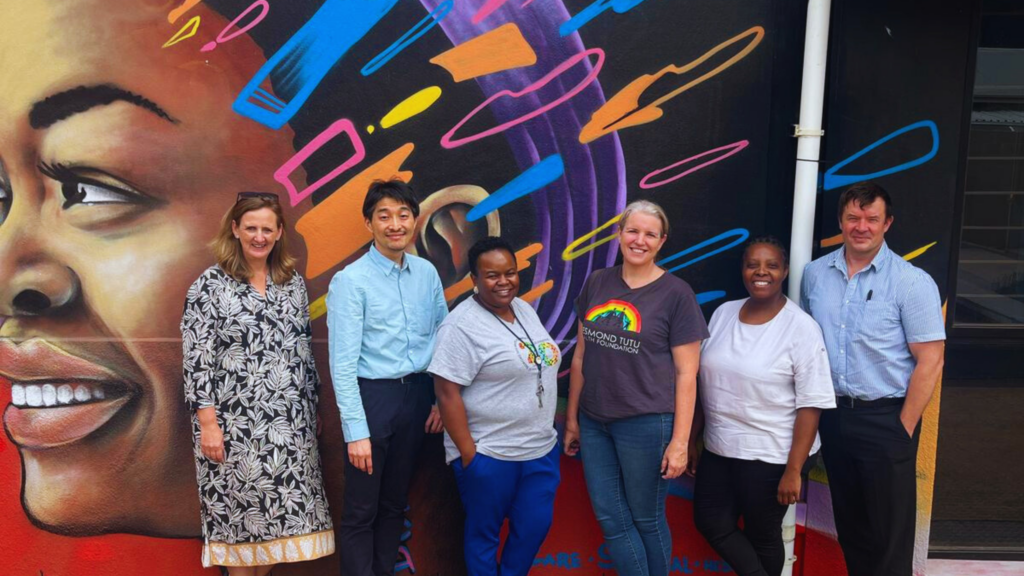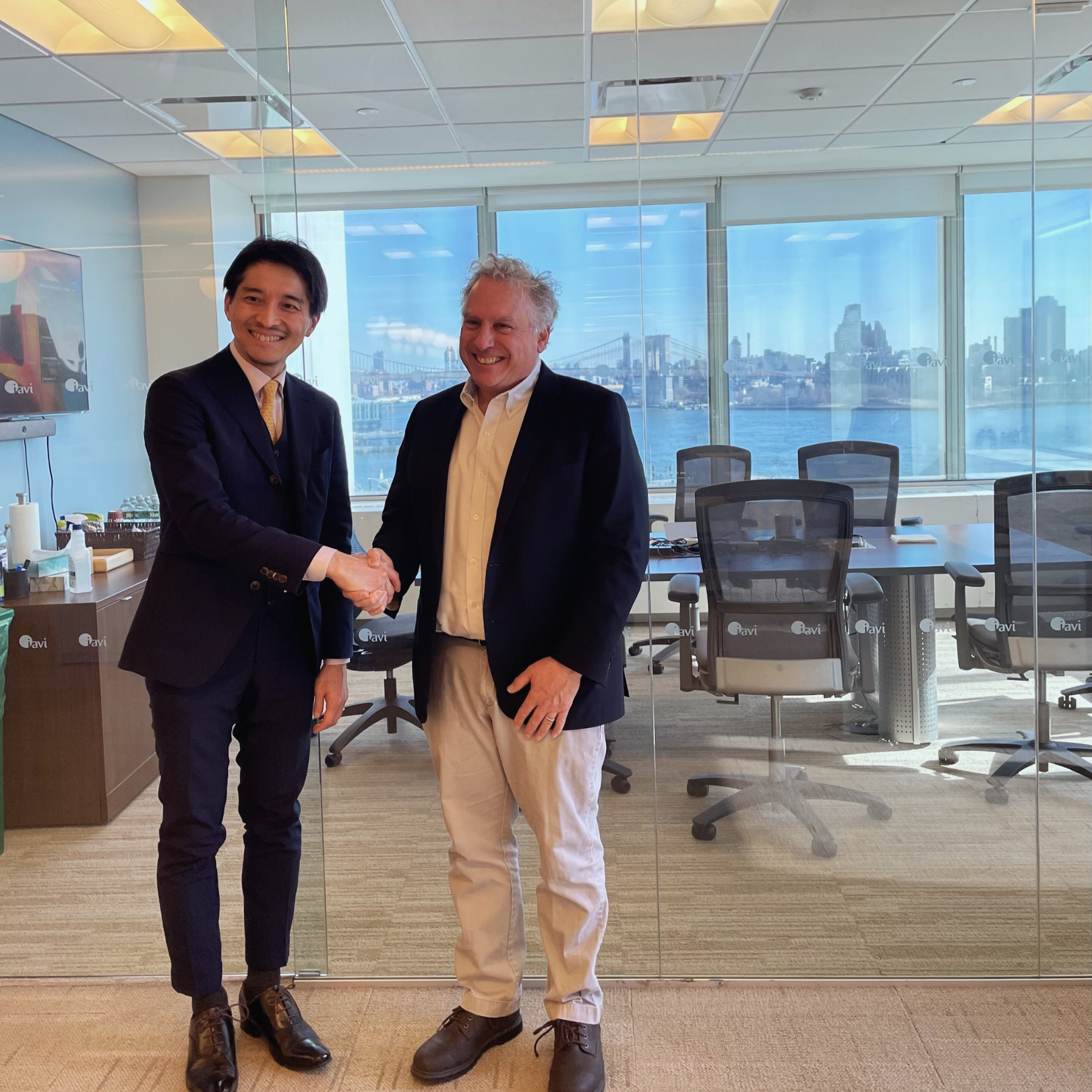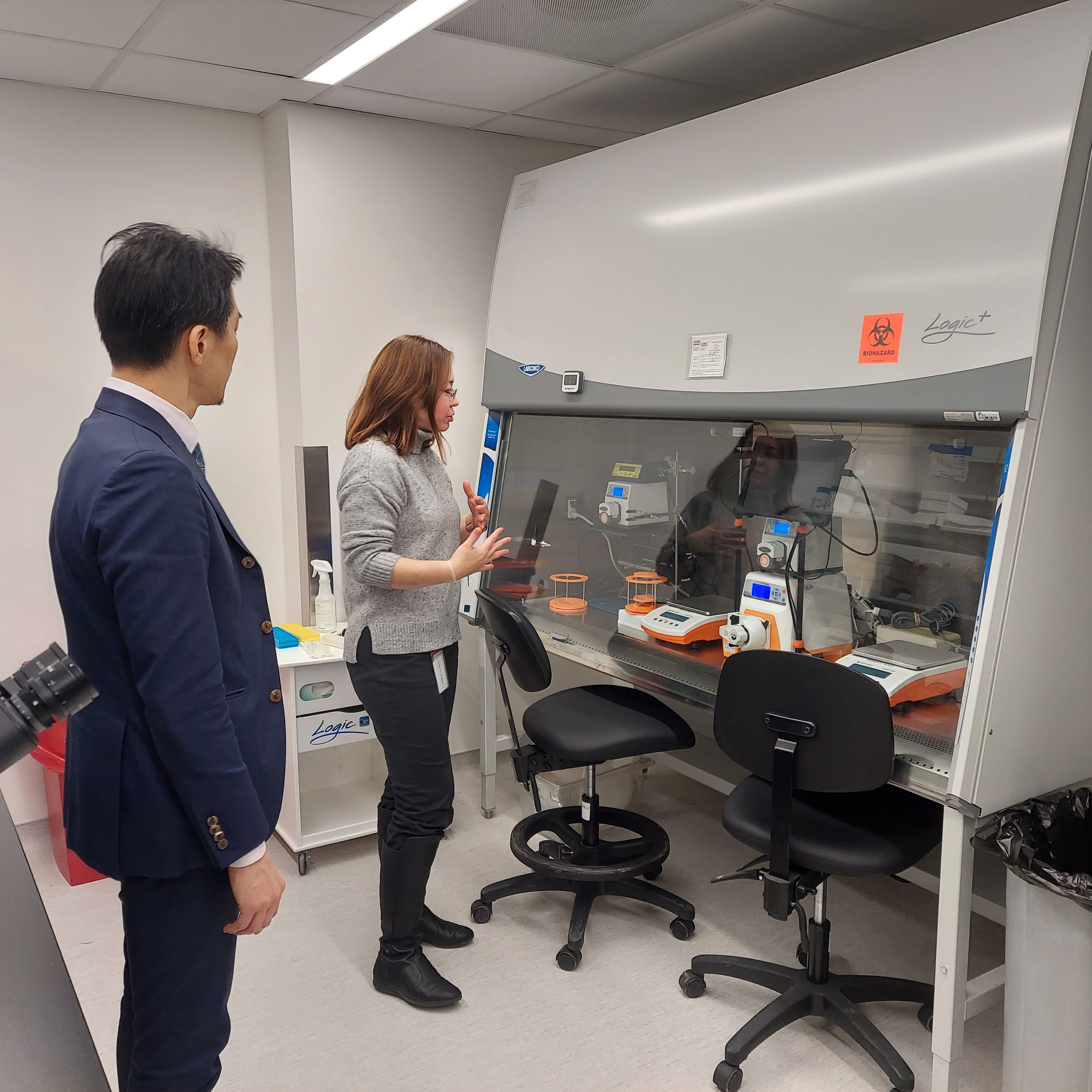April 1, 2025
IAVI and Japan’s premier global health organization pilot Human Resource Development Program
Visiting scientist Taka Funaki learned about IAVI’s discovery, regulatory, manufacturing, and clinical trial expertise in the program’s first two-week exchange.

IAVI was delighted to host Takanori (Taka) Funaki, M.D., chief of the Center for Research Planning and Coordination at Japan’s National Institute of Infectious Diseases (NIID), now part of the new Japan Institute for Health Security (JIHS), from Feb. 24 to March 6. Funaki was the inaugural participant in our joint Human Resource Development (HRD) Program, created after IAVI and NIID signed a 2023 memorandum of understanding with the goal of providing knowledge-sharing and scientist exchange opportunities across both organizations. This program presents an exciting avenue to continue building IAVI and Japan’s long-term partnership by focusing on international research and development (R&D) cooperation to control infectious diseases.
Funaki spent one week at IAVI’s New York, U.S., hub, with a stop at our Vaccine Design and Development Laboratory (DDL), to learn how IAVI manages different stages of the vaccine R&D cycle. He then traveled to IAVI’s Cape Town, South Africa, hub to gain firsthand experience in clinical trial operations. This programming enabled Funaki to build new relationships, deepen JIHS’ global engagement in vaccine R&D, and bring useful learnings back to Japan’s scientific community.

Funaki is a trained pediatrician who specializes in infectious diseases. He has rich experience in clinical research and is committed to promoting Japan’s international joint vaccine R&D in his role at the Research Planning and Coordination Center. Previously, he served as chief physician at the National Center for Child Health and Development’s Division of Infectious Diseases.
“Since we have a long-standing collaboration with NIID, it was a pleasure to connect with Dr. Taka and hear his perspective as a pediatric infectious disease physician. We were excited to learn about the new JIHS and how its mission aligns with IAVI’s focus on emerging infectious diseases. I look forward to strengthening our relationship with this organization, as there is mutual interest in advancing vaccine technologies and new vaccines,” said Christopher L. Parks, Ph.D., associate vice president of viral vaccines and head of the DDL.
Viola-Marie Raubenheimer, director, clinical operations, echoed Parks and added, “It was a privilege to host Dr. Taka at IAVI’s Cape Town office and join him on two clinical research center visits at Desmond Tutu Health Foundation and TASK to demonstrate how these sites function in their communities. After discovering how IAVI and JIHS’ objectives overlap, we welcome further collaboration.”
Following this successful pilot, IAVI hopes to expand the HRD Program alongside the new JIHS. Read on for a Q&A with Funaki about his experience at IAVI. This includes highlights and takeaways from his visit, as well as his ideas for future cooperation.
What is one highlight from each of the IAVI locations you visited?
- DDL: IAVI’s recently relocated research laboratory in Jersey City, New Jersey, is functionally designed and equipped with state-of-the-art equipment. Leading scientists primarily conduct basic research for vaccine development, and multiple DDL teams (vaccine design, vector evaluation, in vivo studies, and immunobiology) collaborate seamlessly from early vaccine candidate design through preclinical evaluation.
- New York office: IAVI’s U.S. hub not only benefits from its prime location but also functions effectively both horizontally and vertically as an organization. I had the opportunity to meet with the CEO, Mark Feinberg, M.D., Ph.D., and other key executives, which provided me with valuable insights into IAVI’s governance, leadership, partnership model, and strategic direction as a non-profit organization that carries out end-to-end vaccine R&D while ensuring access to public health solutions in LMICs.
- Cape Town office: IAVI’s South Africa hub currently serves as a focal point for multiple projects focused on HIV, tuberculosis, and emerging infectious diseases — particularly Lassa fever. They have established a community engagement division tailored to local needs, as well as a new pharmacovigilance division. These efforts extend beyond South Africa and consider regional linguistic, social, and cultural differences while continuously improving operations based on lessons learned. I also had the opportunity to visit several clinical trial sites with IAVI staff. The close collaboration among stakeholders to identify and address challenges in vaccine R&D was particularly impressive.
What insights about IAVI did you bring back to JIHS?

- The newly established JIHS places significant emphasis on end-to-end R&D of vaccines and therapeutics. Observing IAVI’s execution helped us understand the essential divisions, components, and prioritization strategies necessary for effective R&D.
- Key considerations for both the soft and hard aspects of conducting research and clinical trials, from the preclinical stage to first-in-human studies and beyond — particularly in an international context.
- The importance of both generalists and specialists in advancing vaccine R&D. IAVI has outstanding personnel with diverse expertise, and the collaboration between its overarching governance and operational/technical divisions is crucial.
- The need to promote the development of human resources to continuously improve vaccine R&D.
- I was impressed by IAVI’s sophisticated project management approach, which ensures careful oversight of R&D for each pathogen. IAVI clearly defines each role and manages project progress through quality assurance in vaccine manufacturing, and close collaboration with data management and epidemiology teams in clinical trials.
- The deep involvement of legal and intellectual property experts from the preclinical phase was noteworthy. Their engagement extends beyond the national and regional levels, fostering collaboration with regulatory authorities from a global perspective.
- At the DDL, I found it refreshing that team members are cross-trained, allowing them to collaborate seamlessly across different teams.
What future collaboration and knowledge-sharing opportunities would you like to see between our organizations?
- The optimization and expansion of the recently initiated HRD Program is of great value. Sustained training of necessary personnel is crucial to conduct successful end-to-end vaccine R&D and establishing a model for human resource development in this field would be highly beneficial. For example, although the duration of my program was limited, it was invaluable in providing a comprehensive overview of how IAVI, as a non-profit organization, coordinates across various regional offices, labs, partners, and stakeholders to advance vaccine R&D consistent with IAVI’s scope. Additionally, it is essential to allow staff to gain hands-on experience and expertise in relevant fields for both short-term and long-term periods via this program.
- Joint R&D in pharmaceutical sciences — including international collaborative research at basic, translational, and clinical levels — as these align with the interests of both IAVI and JIHS.
- Regular meetings or forums involving experts from both organizations to discuss various interests in the field of vaccine development.
Is there anything else you would like to share?
The hospitality of everyone at IAVI was remarkable. I am truly grateful for the opportunity to participate in the HRD Program’s global itinerary.
Answers have been edited for length.